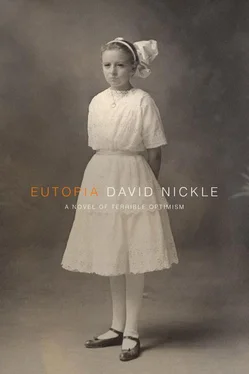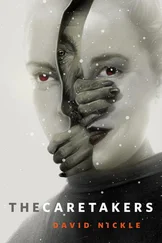And with those words, all the fear melted from Aunt Germaine—Mrs. Frost. In its place rose an expression that Jason could only describe as glee.
“Yes,” she said, nodding. “It is up, isn’t it? You’ve divined my purpose, my hero.”
If Germaine Frost were afraid of getting shot this morning, she showed no sign of it.
“Stop calling me your hero,” said Jason.
“All right,” said Germaine. “Though it’s true.”
“Truer than me being your nephew maybe.” Jason braced his arm against the weight of the gun. “Why don’t you tell me how you came to tell me you were my aunt. How you know my mama to pretend at bein’ her sister.”
“Oh, from the Cracked Wheel Town Hall,” said Germaine. “I knew her, and your father, and many others.”
“What you mean by that?”
She leaned forward. “Records, Jason. I had ample time to peruse them all—in the long days that the Cave Germ took to finish its work.”
She smiled at that—or maybe at Jason trying to work it out. Whichever it was, Jason didn’t care for it, having this lying old woman, who’d abducted him (that was the only word for it) smirking at his ignorance.
“The Cave Germ from the Belgian part of Africa. That Mr… . Dew Lake sent you all those letters about?”
“ Dulac ,” corrected Germaine. “From the Belgian Congo. You’re a clever boy, Jason. But you are not quite clever enough to translate my private letters—not unaided, hmm? Why don’t you give me that gun. You’re shaking, Nephew—”
“Don’t call me that!” The gun had been lowering, and Jason held it up and drew the hammer back. That got Germaine’s attention. She held up her hands in clear surrender.
“All right.” Her voice had a bit of a shake to it. “May I call you Jason?”
“You may,” said Jason. “You can tell me about those letters now. That Dulac fellow—you fixin’ to marry him?”
Germaine’s hands lowered slightly. “Marry?” In spite of her predicament, she chortled. “Oh, no. Maurice is not the marrying sort. No, Neph— Jason , my correspondence with M’sieur Dulac is strictly professional. He is an operative at a plantation in Africa—not too far up the Congo River. We have never met face to face.”
“How do you know him then?”
“Correspondence,” said Germaine. She shrugged. “We had, I suppose, become intimate sufficient to trick the eye of one with schoolgirl French. But we are professional colleagues, Jason.”
“You mentioned that.”
“I prefer to make myself clear,” said Germaine. “M’sieur Dulac would not relish any confusion on the matter either. He has already risked so much, so much… .”
“How’d he do that?” Jason had spent long enough with Germaine to know that she told her stories in her own time—and he could tell by the way she perched, her thick shoulders arched like a child’s by fireside, that she was building towards an important one now—but he was getting impatient.
“M’sieur Dulac had been working on this sugar plantation for some time. He was on the one hand managing the vast crew of jungle niggers that his company employed—but he also made a study of them. For these were not like the niggers you find in America—weak and foolish and prone to crime—but proud savages. Still you could not trust them, for crime and deceit is congenital to that race. But Dulac conspired—conferred with the physician there to make good records of their health. And as he told me, there was one nigger—particularly tall, with teeth strong and thick and endowment prodigious even for his species—he who walked alone. No wife, nor mother, nor sibling, did he have—and he rarely spoke to others. This nigger came from a village some miles back in the jungle—a village that, the stories told, had been ravaged by a fever that came from the earth—” she chuckled “—from a dank cave inhabited by Devils! Only this nigger—only he—had walked away from it. The superstitious darkies—they all thought it was Devils at work, but Dulac—he, like myself, was a man of science. Devils do not bring up sores, or stop hearts with congestion or drive fevers high. No. It was a germ at work.”
“A germ.” Jason shifted the gun’s weight from one hand to the other. “That’s the Cave Germ,” he said.
Germaine nodded, her smile broadening. “It took not nearly so much doing as you might think to take that lucky, strong nigger back through the jungle roads to the ruin of his village. Oh, Maurice described it in such detail, I recall it though the letter’s not before me. Burnt circles lay where grass-made huts had been prior, only discernible from the fire pits by the presence of so many bones… . The nigger didn’t weep, though Maurice could tell it weighed upon him mightily. But they knew the nigger had nothing to fear; not there—not even, although they had to whip him to it, on moving aside the branches and stones at the entrance to the cave from whence the sickness came—nor when they forced him into it, one final time. For he was immune! He, of the scores of people in that village, was immune to the terrible, killing illness.”
“M’sieur Dulac,” said Jason, his voice quavering, “sent that nigger into the cave to collect some Cave Germ,” he said. “In clay pots. Ain’t that right?”
Germaine nodded. “He was a good nigger, as much as the species is capable. He plucked it from bat guano in that cavern. He was even so kind as to seal the pots with wax, and douse them with alcohol. Maurice,” she added, “was kind enough to let the nigger finish the bottle of brandy, before he shot him and collected the jars.”
Jason felt like he was going to upchuck. He leaned against the windowsill. “And he sent you a jar.”
“Or two,” said Germaine. She stood up from the bed, her hands wringing in front of her, her smile wider now.
“And you—you opened one of them in Cracked Wheel,” said Jason. “You—” killed my mama , he was going to say, but of course she had done more than that. She had murdered an entire community—every man, woman and child with the misfortune to set foot in Cracked Wheel that winter’s day, and then every man, woman and child who’d met them before the disease showed symptoms. Killed his mama she might have—though Jason felt the pain as acute now as he did that night she died—he knew that his mama’s death paled against this woman’s larger crime.
Germaine Frost had killed a town.
“Yes,” said Germaine. “I opened one in Cracked Wheel—and by its grace, Jason Thistledown—” she stood so that the gun’s barrel nearly touched her shoulder “—I found you .”
Jason squeezed the trigger. But Germaine had already pushed it to the side and before Jason could squeeze off a second shot she had the gun from his sweat-slicked hand, and driven her fist into his groin so hard he slammed against the window hard enough to crack glass. Jason didn’t fall out, though—just slid down to the floor, the pain in his gut and middle renewed and amplified. When he opened his eyes, Germaine was standing over him, the gun trained on him.
“I can’t see any reason for me to apologize,” she said coldly, “but I shall in any event. Nephew .”
“You killed—” Jason choked and pressed himself higher “—you killed all those folks.”
“Culled,” said Germaine. “That’s what I did—what the germ did. By my own hand, I only killed one person—a sickly old man, who tried to gain entrance to the town office. And I may not have killed him. Do you recall that window pane? The one that you remarked upon, with the bullet-sized hole in it?” She smiled, and let out an incongruously girlish giggle. “Oh, it was all I could do to keep from laughing aloud, when you pointed that out. Laughing aloud. Do you remember?”
Читать дальше









![David Jagusson - Fesselspiele mit Meister David [Hardcore BDSM]](/books/486693/david-jagusson-fesselspiele-mit-meister-david-har-thumb.webp)


